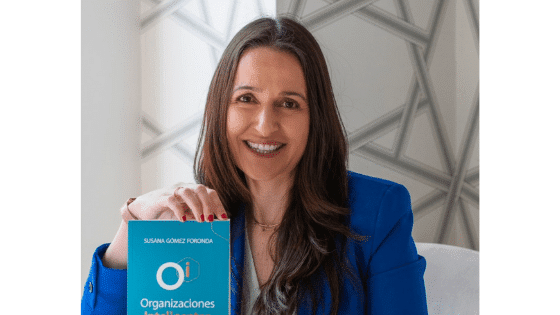This Thursday we interview Susana Gómez Foronda, an expert in culture, leadership and talent. Her solid and extensive experience as an entrepreneur, manager, advisor and consultant of recognised prestige positions her as a benchmark in Cultural Transformation, Organisational Development, Talent Management and Leadership for the development of Sustainable High Performance Teams and Organisations. Co-Founder and CEO of Smart Culture, a consultancy whose mission is to align the Culture and People of an Organisation with its Business Strategy, creating attractive and high performance work ecosystems. "Smart Organisations" is her latest book published in 2021.
Welcome, Susana. To begin with, we would like you to tell us a little about yourself and your passion for people management.
I consider myself a 21st century thinker who puts her experiences, thoughts and learning at the service of organisations, teams and individuals who want to develop and succeed in what they set out to do. I am absolutely convinced of the need for organisations to transform themselves into high-performance ecosystems where people can realise business and personal goals, where people enjoy and develop, where people go home proud every day because they feel they have added value that day.
How would you define a smart organisation in a nutshell?
What is essential to consider in order to develop a smart organisation?
How do you lead a smart organisation?
Based on my experience helping leaders and teams, a leader of an organisation will focus on implementing actions to create a motivated, productive and committed team:
- Reducing emotional stress: there are several ways to achieve this, such as introducing humour into interactions with employees or reducing demands without losing excellence.
- Trust in the face of uncertainty: the last thing a leader can do is to behave erratically and derail continuously because it aggravates the situation. Working on the 5 fundamental aspects of trust is now more important than ever: Competence, Reliability, Transparency, Common Interest and Vulnerability.
- Providing meaning and significance: Talking about purpose is the key to a company, team or individual successfully overcoming this situation. A leader creates a space for reflection so that everyone understands the purpose of the team, its contribution to the organisation and its importance.
- Developing new skills: A good leader knows how to make a collective and individual diagnosis of strengths and areas for improvement in order to combine day-to-day work with a team development programme tailored to those identified development needs.


 Employee database
Employee database  Documents and e-signature
Documents and e-signature  Reporting and analytics
Reporting and analytics  Payroll and incidents
Payroll and incidents  Time and Attendance Software
Time and Attendance Software  Shifts and task list
Shifts and task list  Absences & time-off
Absences & time-off  Workflows
Workflows  Expense management
Expense management  Recruitment and selection software
Recruitment and selection software  Onboarding
Onboarding  Training and procedures
Training and procedures  Internal communication
Internal communication  Performance assessment software
Performance assessment software  HR surveys and forms
HR surveys and forms  Chatbot
Chatbot 